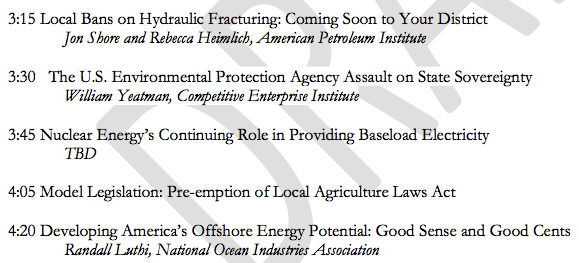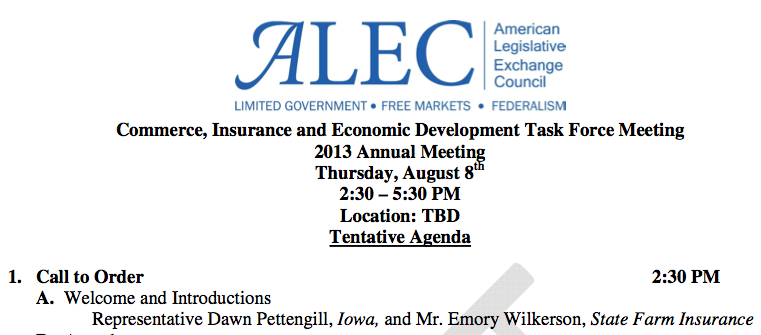Submitted by Brendan Fischer on
CHICAGO -- This week, the corporate and legislator members of the American Legislative Exchange Council are meeting at the swank Palmer House hotel in Chicago to celebrate the organization's 40th anniversary, be educated in corporate sponsored workshops and adopt legislative priorities for the coming year. Here is what is on the agenda for ALEC's 40th -- notably, some of the workshops carry a $40,000 pricetag for corporate sponsors.
Fracking, Virtual Schools, and Privatization
- New ways to thwart local democratic control by prohibiting city or county governments from regulating genetically modified plant seeds. Members of the Agriculture Subcommittee -- which is chaired by Jeff Case of CropLife America -- will consider a bill to thwart local democratic control by prohibiting city or local governments from regulating genetically modified plant seeds, which happens to benefit many members of CropLife's trade association and other big ag companies. Contrary to Jeffersonian principles of local democracy, for years ALEC has promoted bills to preempt local efforts to establish everything from paid sick days to municipal broadband.
 Presentations on how fracking America can lead to increased profits through exporting America's natural gas. American Petroleum Institute representatives Jon Shore and Rebecca Heimlich will give a presentation on "Local Bans on Hydraulic Fracturing: Coming Soon to Your District." Jason French of energy company Cheniere Energy will present to the Energy Subcommittee about "LNG [Liquid Natural Gas] exports: A Story of American Innovation and Economic Opportunity."
Presentations on how fracking America can lead to increased profits through exporting America's natural gas. American Petroleum Institute representatives Jon Shore and Rebecca Heimlich will give a presentation on "Local Bans on Hydraulic Fracturing: Coming Soon to Your District." Jason French of energy company Cheniere Energy will present to the Energy Subcommittee about "LNG [Liquid Natural Gas] exports: A Story of American Innovation and Economic Opportunity."- Discussions of the wonders of nuclear energy and offshore drilling. Other energy-related agenda items include a presentation on "Nuclear Energy's Continuing Role in Providing Baseload Electricity," and another on "Developing America's Offshore Energy Potential: Good Sense and Good Cents." ALEC will also consider a "Resolution in Opposition to a Carbon Tax."
- More climate change denial? Members of the Energy, Environment, and Agriculture Task Force will be part of a breakfast plenary session called "A Thoughtful Approach to Climate Science." The title is less inflammatory than some of its past panels -- at the 2011 ALEC meeting, legislators attended a workshop titled "Warming Up to Climate Change: The Many Benefits of Increased Atmospheric CO2" -- but given ALEC funders like the Koch brothers and members like the Heartland Institute, it seems unlikely that the organization has woken up to the dangers of climate change.
- Discussions about blocking GMO labeling laws and ordinances that would allow consumers to know if they are buying genetically engineered food, one of the goals of agribusiness and chemical firms that bankroll ALEC.
- Redoubled efforts to undermine renewable energy initiatives and maintain reliance on coal and other fossil fuels. One workshop, which cost $40,000 to sponsor, is titled "The Economic Benefits and Political Challenges to Coal Exports." Also on the docket is another bill to repeal renewable energy standards, the "Market Power Renewables Act," after the failure of the ALEC "Electricity Freedom Act" in 2013. As explained by the Checks and Balances Project:
The "Market-Power Renewables Act" will likely serve as the model for another round of attacks on state Renewable Portfolio Standards (RPS) in 2014 following ALEC's failure to weaken or eliminate clean energy policies this year. The new bill would significantly weaken state clean energy laws by broadening the eligible electricity sources to include existing, large hydroelectric power plants, biomass, biogas and other sources of electricity.
- Updates to some of ALEC's long-standing anti-union policies. The "Employee Secret Ballot Protection Act" will be amended "to call for [union certification by] a majority of members in the bargaining unit, rather than a majority of those voting." This was the same certification policy pushed by Scott Walker in Wisconsin, and creates an almost insurmountable burden: few governors or presidents would ever win election if they had to win a majority of all eligible voters, rather than just a majority of those who vote.
- Renewing objections to linking the minimum wage to the consumer price index. ALEC plans to brush-off and renew its "Resolution Opposing Increases in Minimum Wage Linked to CPI." In an apparent recognition that their justifications for opposing minimum wage increases are disintegrating, they will eliminate this line: "In reality, of the approximately 2.7% of U.S. workers that earn the minimum wage, two-thirds (2/3) will earn an increased wage in a year."
- Privatization and outsourcing of toll roads. Members of the Transportation Subcommittee will discuss "ALEC Principles on Toll Roads," which backs privatization of toll rolls, and is particularly relevant to ALEC members Cintra, Macquerie, and Transurban (all foreign firms). Cintra and Macquarie have teamed up to cut multi-billion dollar contract deals to take control of highways in places like Indiana, basically granting companies a monopoly to help state government raise quick revenue in the short term, but in the long-term saddling consumers with higher fees and the state with lost revenue.
- New efforts to eliminate occupational licensing for any profession, which help ensure that people who want to call themselves doctors, long-haul truckers, accountants, or barbers meet basic standards of training and expertise to guarantee that consumers are safe and get what they pay for.
- Expanding virtual "schools," which enriches ALEC's online school corporate funders, such as K12 Inc. The Illinois Policy Institute -- the State Policy Network affiliate in the state -- will present on "digital education." IPI employees had pushed a Virtual Charter School plan in Illinois, apparently in collaboration with ALEC member K12 Inc., the nation's largest provider of online charter schools (which has become notorious for poor educational outcomes and high profit margins). Additionally, at least two "workshops" -- which carry a $40,000 pricetag -- will deal with online education: "Modeling State Funding Formulas, K-12 Online Course Providers" and "Statewide Full-Time Virtual Schools: The Case for Parent Choice vs. Local Control."
- More flawed testing for colleges. ALEC has long promoted increased reliance on high-stakes testing for elementary and high school students, which many educators say has altered the classroom dynamic and interfered with teaching. A bill to be considered at the Chicago meeting will impose that same costly testing regime to the college level with "The Collegiate Learning Assessment Bill."
Like a Good Neighbor, State Farm Is There (with Bounty Hunters)
 In the past year, at least 49 global corporations have dropped their ALEC membership, apparently recognizing that they don't want their brands publicly associated with an organization that pushes anti-union legislation and discriminatory voting laws.
In the past year, at least 49 global corporations have dropped their ALEC membership, apparently recognizing that they don't want their brands publicly associated with an organization that pushes anti-union legislation and discriminatory voting laws.
But one of the most surprising hangers-on has been State Farm, an insurance company that has crafted an image as a "good neighbor." But some might say it does not seem very neighborly to bankroll an organization that has promoted "Stand Your Ground" laws that make it easier for self-appointed neighborhood watch vigilantes to get away with murder.
State Farm has not only stuck with ALEC, but it has retained a leadership role in the organization, with a State Farm representative acting as the co-chair for ALEC's Commerce, Insurance, and Economic Development Task Force -- the source of ALEC's anti-labor bills and other controversial legislation.
Joining State Farm on that task force is the bail bond industry. Last year, ALEC made a big PR announcement that it was disbanding the controversial Public Safety and Elections Task Force that had been responsible for bills like Stand Your Ground, Voter ID, and prison privatization, but the for-profit bail industry didn't jump ship. The American Bail Coalition President and CEO Bill Carmichael remains on the ALEC corporate board (now called the "Private Enterprise Advisory Council"), and the Surety Insurance Subcommittee -- chaired by the American Bail Coalition's Dennis Bartlett -- is now part of the State Farm-chaired Commerce, Insurance, and Economic Development Task Force.
ABC, the for-profit bail bond industry's national organization and lobbying wing, has long been involved with ALEC, calling it the industry's "life preserver."
Raising the question, do bounty hunters make for good neighbors?

Comments
Anonymous replied on Permalink
Privatization
Daniel Wolk replied on Permalink
State Farm and ALEC